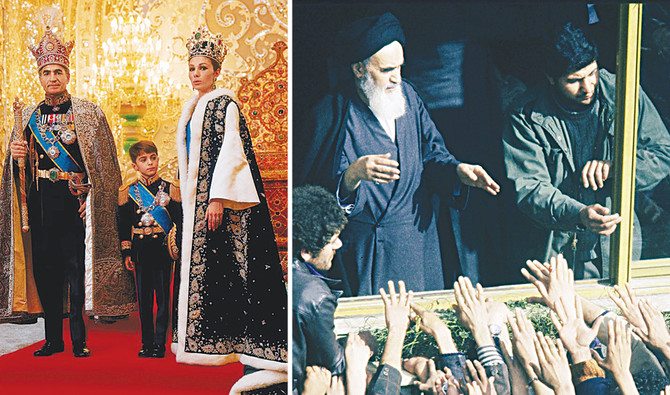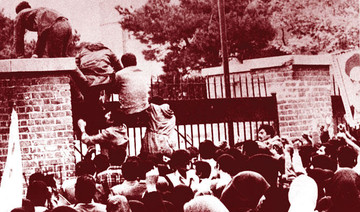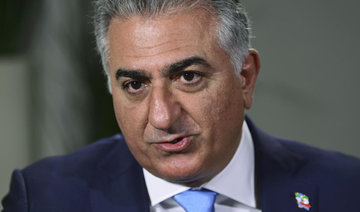DUBAI: Forty years ago today, Iran’s then-shah, Mohammed Reza Pahlavi, fled the country after a 37-year reign, in the first stage of a revolution that would replace 2,500 years of monarchy with an Islamic republic.
Prior to the revolution, Iran very much resembled Western countries, with a flourishing economy and tourists flocking to the country for its breath-taking landscapes, beaches and various activities, including hiking and skiing.
The shah’s departure, prompted by mass protests, paved the way for Ayatollah Ruhollah Khomeini to return from exile in France, assuming power on Feb. 11, 1979.
It was “a genuine social revolution against tyranny, domestic and foreign — the first represented by the shah and the second by… the US,” said Dr. Albadr Al-Shateri, politics professor at the National Defence College in Abu Dhabi.
“The revolution went awry when religious leaders dominated the government, imposed its version of Islam and eliminated their partners in the revolution, including Iranian nationalists.”
Not long after Khomeini took over, the world got a taste of the new regime. Fifty-two American diplomats and citizens were taken hostage on Nov. 4, 1979, and were held for 444 days, after a group of Iranian students who supported the revolution took over the US Embassy in Tehran.
The Iran-Iraq war, which began in 1980 and lasted for eight years, contributed to the deterioration of Iran’s situation.
“Fear of the new regime’s attempt to export the revolution to a Shiite-majority neighbor led Iraq to initiate the war,” Al-Shateri said.
“However, Iran’s insistence on continuing the war until the toppling of the regime of Saddam Hussein exacted a heavy cost on both countries in human and economic terms,” he added.
“Iran had legitimate grievances against the US, but the way it tried to redress these gripes was counterproductive.”
The shah was considered one of the best customers of the US defense industry. But his Western-inspired reforms sparked turbulent social change that aggravated the clergy, while his consolidation of power and the secret police gave him the reputation of a dictator.
 Opposition to his reign and corruption among Tehran’s elite created an influential alliance of radical Islamists.
Opposition to his reign and corruption among Tehran’s elite created an influential alliance of radical Islamists.
Although Pahlavi tried to modernize Iran, driving up oil prices in the early 1970s and implementing reforms in education and health care, he became alienated among Iranians and angered the conservative clergy, who helped drive his exile.
“Iran changed significantly from before the revolution to after, from a more civil, open and decent Iran to a closed, aggressive and sectarian one,” said Abdulkhaleq Abdulla, former chairman of the Arab Council for Social Sciences.
“Post-1979 Iran is deeply sectarian, and is not only responsible for sharpening the Sunni-Shiite divide, but also wholly responsible for politicizing and militarizing it,” he added.
Iran “has funded and armed Shiite militias, and has done everything possible to strengthen them so they can challenge the nation-state, Lebanon being a clear example.”
Post-1979 Iran does not “play by the rules of the game,” Abdulla added. “It became radical, revolutionary and sectarian, and was about to become nuclear, which is deeply destabilizing.”
He said: “Gulf states have lived with Iran for thousands of years, and they knew how to deal with it all along. They had the best possible neighborly relationship, but it has always been a difficult Iran, whether under the shah or Khomeini.”
Abdulla added: “We’ve never seen an Iran that has become the number-one terrorist country in the world except in the last 40 years.”
Mark Katz, professor of government and politics at the Schar School of Police and Government at George Mason University in the US, said: “Unlike the shah’s Iran, the Islamic Republic of Iran sought to export its revolution to other Muslim countries, especially the Arab Gulf ones.” He added: “Still, it must be remembered that the shah’s Iran was also fairly aggressive. It seized Abu Musa and the Tunbs (islands) right when the British were leaving the Trucial States and the UAE was being formed. It had also laid claim to Bahrain.”
Furthermore, while the shah’s troops helped defend Oman against a South Yemeni-backed Marxist insurgency in the 1970s, Katz said the presence of those Iranian troops in Oman was unsettling to Saudi Arabia in particular.
“The shah had also got the best of Iraq in their border rivalry — something that Saddam Hussein sought to reverse after the Iranian revolution,” he added.
Before the revolution, the shah’s Iran often behaved “aggressively toward its Arab neighbors, but its close cooperation with the US against the Soviet Union, which Iran bordered and the Gulf Arab states didn’t, meant that Washington wasn’t willing to act against the shah for doing so,” Katz said. By contrast, the rise of an anti-American government after the revolution led to the US working with Arab Gulf states against Iran.
“Because the Islamic Republic behaved in such a hostile manner, both toward the Gulf Arabs as well as the US, the 1979 revolution led to the isolation and containment of Iran for many years,” Katz said.
“Although it may seem counterintuitive, Iran may have posed a far greater problem for the Gulf Arabs if the… revolution hadn’t taken place, because if it hadn’t and Western investment in Iran continued or even grew, there would’ve been a tendency for Tehran to assert — and the US to value — an Iranian effort to be the leader in the Gulf in collaboration with the US.”



























